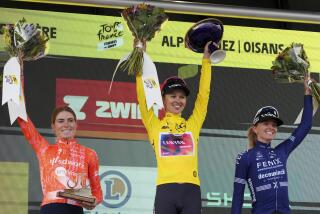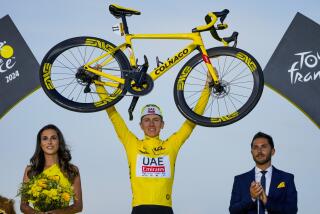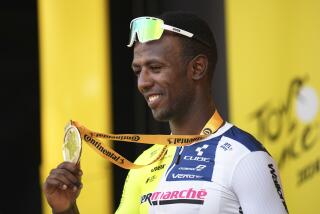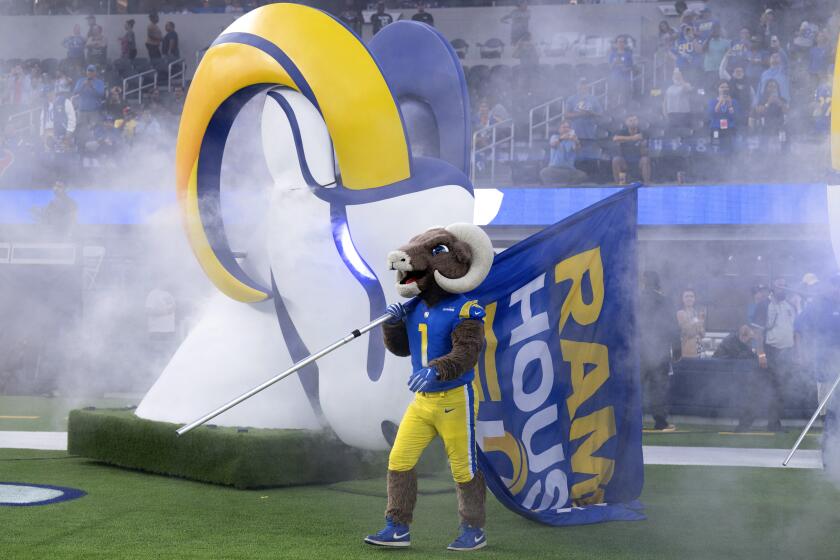All the World’s a Stage for Him
LE GRAND-BORNAND, France — The frame of Lance Armstrong’s bike wobbled beneath him. So fierce was Armstrong’s pedaling, so ferocious was the force of his will, that he seemed almost too strong for his machine while he was out-sprinting Andreas Kloden on Thursday to win Stage 17 of the Tour de France.
It was a stage Armstrong didn’t need to win, yet the victory brought a huge smile to his face. A smile that seemed to say, “Don’t mess with Texas. Don’t mess with Lance.”
For the third consecutive day and the fourth of this Tour de France, Armstrong crossed the finish line first. This time it was at the end of a grueling 126.8-mile Alpine stage, one that included five climbs in the Alps, ridden in oppressive heat that hit 95 degrees.
In an all-out sprint over the final 500 meters, Armstrong sneaked past a stunned Kloden. His victory was by no more than a split second, but it confirmed what had been proven Wednesday in the time trial up L’Alpe d’Huez:
Armstrong is poised to win a sixth consecutive Tour, something never before accomplished.
When Armstrong had won his fifth Tour a year ago by his smallest margin -- 61 seconds -- skeptics said he was becoming too old and tired.
No one is doubting him now.
Armstrong won the stage in 6 hours 11 minutes 52 seconds. Kloden received the same time. Jan Ullrich and Ivan Basso were one second behind. With the time bonuses Armstrong received for winning the stage, he now owns a 4:09 lead over Basso. Kloden is third, 5:11 behind Armstrong, and Ullrich, a five-time Tour runner-up, is in fourth place, 8:08 back.
Should Armstrong win Saturday’s final time trial in Besancon, which he is expected to do, he will have won five individual stages, his best Tour performance ever.
Thursday’s race was one Armstrong wanted for teammate Floyd Landis.
Landis, the son of Mennonites from Pennsylvania who lives and trains in San Diego, set a blistering pace up the final two climbs, pedaling at such a high rate that by the final hill only five riders could stay with him.
At the top of the final climb, with nothing but downhill racing to the finish and thousands of sunburned fans yelling as loud as they could, Armstrong turned to Landis and asked, “How bad do you want to win a stage in the Tour de France?”
Landis answered, “Real bad.”
Armstrong said he then asked Landis, “How fast can you go downhill?” and Landis said, “I go downhill real fast.”
Recalled Armstrong: “Floyd said, ‘Can I do it?’ And I said, ‘Sure, you can do it.’ Then I told him, ‘Run like you stole something, Floyd.’ ”
Wanting is one thing, doing it is another. That’s the difference between Armstrong and every other cyclist in the Tour.
Landis, Armstrong’s U.S. Postal Service teammate, tried to win the stage but couldn’t. So when Ullrich went hard in pursuit of Landis, Armstrong rejoined the chase.
After the race, Bernard Hinault, one of four other five-time Tour winners, met Armstrong on the podium and delivered a brief and pointed comment. “Perfect,” he said. “No gifts.”
There have been other times when Armstrong tried to be gallant and step back to give another cyclist a stage. Most famously, in 2000, Armstrong appeared to let Marco Pantani take the victory at the end of a climb up Mt. Ventoux. Pantani, now deceased, later said he resented the perception of a gift, and the two exchanged heated words over several months.
“I’ve given gifts in the Tour de France, and very rarely has it ever come back to help me,” Armstrong said. “This is the biggest bike race in the world, and it means more to me than any bike race.”
Yet it wouldn’t have been a gift if the 28-year-old Landis, riding his third Tour, had been able to leave Ullrich, Kloden, Armstrong and Basso behind.
“Floyd was the man of the day,” Armstrong said. “To go to the front of the climbs and ride tempo and end up with only five guys is very hard to do. I really wanted him to win the stage. But it didn’t work out that way.”
As he hurried into the team hotel, Landis said, “I couldn’t go any more.”
At the finish line, Landis had told Armstrong, “You’re the man. Nice sprint. I’m glad you got it.”
Kloden seemed to have the stage won when he started the final sprint. But then, Armstrong said, “Something just came over me and I said, ‘OK, I have to go for it. To get to win in the sprints is exciting.’ ”
Afterward, Armstrong was asked, in light of his three consecutive stage victories, whether it was time to start calling him “the cannibal,” the nickname that belonged to Eddy Merckx, the Belgian who won five Tours and who was legendary in his quest for stage victories.
“Am I the cannibal? The answer is no,” Armstrong said.
He is just a man motivated by the doubters, annoyed by the second-guessers, eager to make history.
Armstrong has left the rest of the field happy with smaller victories. Frenchman Richard Virenque clinched the polka-dot jersey, earned by the racer with the most climbing points, for a record seventh time in his career.
Although grateful for his prize, Virenque also reflected on Armstrong’s triumphs.
“I’m happy for Lance,” Virenque said. “What he’s done is not easy. When he has a goal, he always accomplishes it. Despite what was said, when this Tour started I was almost sure Lance would rise up to win it.”
*
(BEGIN TEXT OF INFOBOX)
Spokes Model
Lance Armstrong, who extended his already sizable overall lead on Italian Ivan Basso to 4 minutes 9 seconds, is trying to become the race’s first six-time winner:
*--* CYCLIST COUNTRY WINS YEARS Lance Armstrong United States 5 1999, 2000, 2001, 2002, 2003 Miguel Indurain Spain 5 1991, 1992, 1993, 1994, 1995 Jacques Anquetil France 5 1957, 1961, 1962, 1963, 1964 Eddy Merckx Belgium 5 1969, 1970, 1971, 1972, 1974 Bernard Hinault France 5 1978, 1979, 1981, 1982, 1985 Philippe Thijs Belgium 3 1913, 1914, 1920 Louision Bobe France 3 1953, 1954, 1955 Greg LeMond United States 3 1986, 1989, 1990 Lucien Petit-Breton France 2 1907, 1908 Firmin Lambot Belgium 2 1919, 1922 Ottavio Bottecchia Italy 2 1924, 1925 Nicolas Frantz Luxembourg 2 1927, 1928 Andre Leducq France 2 1930, 1932 Antonin Magne France 2 1931, 1934 Sylvere Maes Belgium 2 1936, 1939 Gino Bartali Italy 2 1938, 1948 Fausto Coppi Italy 2 1949, 1952 Bernard Thevenet France 2 1975, 1977 Laurent Fignon France 2 1983, 1984
*--*
More to Read
Go beyond the scoreboard
Get the latest on L.A.'s teams in the daily Sports Report newsletter.
You may occasionally receive promotional content from the Los Angeles Times.










